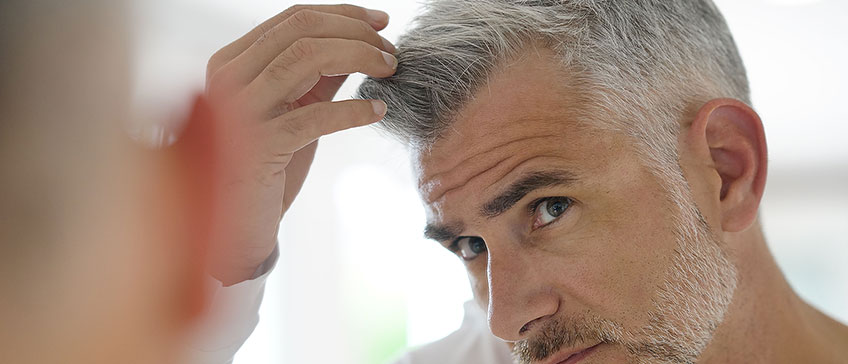Hair loss is a common problem in men – 50% of middle-aged Caucasian men are affected by some degree of baldness, and in old age, baldness affects up to 80% of this population.
Men's hair loss is thought to be largely due to a combination of genetic factors, hormones and age.
In addition to androgenic alopecia, hair loss can be related to other causes, among which the most common are some types of medication, stress, negative environmental influences and nutritional deficiencies (iron, zinc and vitamin B).
It is normal for hair to fall out – losing 70 - 10 hairs a day is a completely normal physiological process, especially hair loss while washing. Hair grows, is dormant and decreases, and new hair grows in its place. The problem occurs when more than 100 hairs fall out and the hair cannot be restored or stopped.
Reversible forms of hair loss (alopecia) can be alleviated, and with proper care, mesotherapy and own blood treatments can promote hair renewal. In the case of irreversible hair loss, regrowth is not possible, but with the modern FUE method of hair transplantation, it can very well replace lost hair.
In any case, as soon as you notice that your hair has started to fall out a faster pace, consult a dermatologist who will detect the cause of it. Specifically, in addition to the hereditary factors that cause harmless male baldness pattern, some types of alopecia indicate various diseases, tumors or hormonal problems. Therefore, the first step in treating alopecia is to have a complete examination and correct diagnosis.
At Bagatin Clinic, you can get answers to all your questions, diagnostics, as well as different methods of hair loss treatment.
The most common cause of hair loss in men – androgenic alopecia
The most common cause of hair loss in men is androgenic alopecia. This type of hair loss is thought to be related to hereditary factors, hormones and age. It can occur as early as the twenties and slowly progress to baldness or only activate at a later age with more rapid and faster hair loss.
Usually, first you notice hair thinning on the flaps and then on the scalp, while in the advanced phase the hair remains only around the temples, on the scalp and nape of the neck.
Androgenic alopecia in women is also the most common cause of hair loss, but not so drastic and is most evident in the area of the parting and the top of the head. It usually occurs in menopause or old age.
Men and women baldness - Ludwig and Norwood-Hamilton scale
Experts use the Ludwig scale to estimate the degree of hair loss in women, while the Norwood-Hamilton scale, which defines 7 stages of baldness, is used in men.
Androgenic alopecia is a condition in which androgens, the male sex hormones, weaken the follicles, which become smaller and produce shorter, thinner hairs until hair growth is completely stopped.
In most cases, androgenic alopecia is a harmless genetically predetermined phenomenon. But in some cases, hair loss can also be due to various tumor diseases, hormonal disorders, and taking some types of medication. Therefore, it is important to accurately diagnose the cause of hair loss before accessing cosmetic procedures.
Alopecia areata – focal hair loss
Alopecia areata is the second most common form of baldness. It is a focal hair loss in a larger or smaller area of the scalp or body. It is equally common in both sexes. If all the hairs fall out, we are talking about total alopecia, and when all the hairs and body hair as well fall out, it is a so-called universal alopecia.
It occurs for a variety of reasons, most often due to an autoimmune disorder in which the immune system attacks the follicles and thus causes excessive and rapid hair loss. This type of baldness can also occur after exposure to high stress, as well as in people who have elevated thyroid antibodies.
Unlike androgenic alopecia, which causes permanent hair loss, with alopecia areata hair regrows again in 90% of cases. About half the people affected by this condition will have their hair regrown within half a year.
Telogenic effluvium
Telogenic effluvium is a condition in which the hair enters a resting state to soon, and then falls out prematurely. This causes too many hairs to be lost that cannot be restored, resulting in thinning hair throughout the scalp.
It is usually a temporary hair loss and the hair will regrow.
The causes of telogenic effluvium are different – sometimes it is a matter of exposure to high stress, toxins from the environment, the consequences of some diseases or taking certain types of medicine. Sometimes it occurs in menopause or during pregnancy and after childbirth, and a possible cause is the lack of micronutrients in the body (iron, zinc, vitamin B).
Methods of treating alopecia
If you notice that you are losing more than 100 hairs per day, it is important to seek the opinion of a dermatologist as soon as possible to rule out diseases and hormonal problems and then suggest the best way to treat hair loss.
In cases of permanent hair loss (androgenic alopecia), the best (and often the only) treatment is - hair transplantation.
At Bagatin Clinic we are working with the latest FUE method of transplantation.
This is a minimally invasive method that grafts follicles from the donor region (areas with more hair) to areas where hair is missing. Unlike the older methods, the procedure is done with needles (not a scalpel), so there are no scars and the scalp heals very quickly, without scars and signs of transplantation.
Since it is your own hair, when the hair grows, it will blend in harmony with the rest of the hair, leaving a completely natural impression.
FUE transplantation is minimally invasive, so recovery is easy and quick. For up to a week, the person can return to his normal activities, and no traces of the intervention are visible on the scalp.
Besides transplantation at Bagatin Clinic, we also offer treatments that promote hair growth and repair – in cases of reversible hair loss, and as an additional aid to the scalp after transplantation – mesotherapy and stem cell therapy from our own blood. These treatments deeply nourish and recover the hair follicles and all cells of the scalp, helping to preserve and regrow hair.
Mesotherapy is a non-surgical and minimally invasive method of aesthetic dermatology. Helps the scalp to recover by injecting cocktails of vitamins, minerals, antioxidants, hyaluronic acid and other active substances directly into the scalp. This method has been used for over sixty years for hair restoration, but also for rejuvenating face and body skin and has very good results. Hair that falls out due to lack of nutrients or similar difficulties, hereby receives a strong incentive to restore and stop the process of hair loss.
Hair thinning therapy with own blood is an innovative method in which the use of blood plasma from one’s own blood promotes scalp renewal. Platelets, bio-active substances and growth factors naturally found in blood plasma are natural and effective ways of nourishing and promoting cell regeneration.
Androgenic alopecia can also be treated with certain medications (minoxidil, finasteride, antiandrogens or estrogens), but given that these drugs are potentially toxic, the decision to take them must be made by a specialist dermatologist.
It is important to note that at Bagatin Clinic, these medicines are available in the form of sprays or gels for topical application, which also provides an equally effective hair growth stimulant without the side effects that may occur when taken as tablets. Topical application of these sprays and gels is recommended after a hair transplant at least one year after the transplantation is done, along with the hair thinning therapy with won blood treatment, to further promote hair growth and surgery success. The main treatments for alopecia areata are usually corticosteroids, which can sometimes stop the progression of alopecia and help preserve hair.
Sometimes a doctor may recommend a combination of multiple treatments – for example, a transplant and mesotherapy or a stem cell method to nourish the scalp and encourage the renewal of transplanted hair.
Many men face hair loss. If you are one of them, be sure to contact our expert team, who can offer you the most up-to-date methods of treating alopecia. Prevent hair loss. Contact us with full confidence!
Free online consultation with our doctors
Send enquiryFeel free to contact us
By phone on +385 1 46 10 225 or through our online contact form
Send enquiry
Locations
| Green Gold Tower Ul. Grada Vukovara 269a/10, 10000 Zagreb |
|
| Donji grad Frana Folnegovića 1c/1, 10000 Zagreb |
|
| Dioklecijan Hotel & Residence Kranjčevićeva 45/1, 21000 Split |
Where to park
| Parking available in Green Gold centre, Zagreb underground garage. For detailed information download a map |

